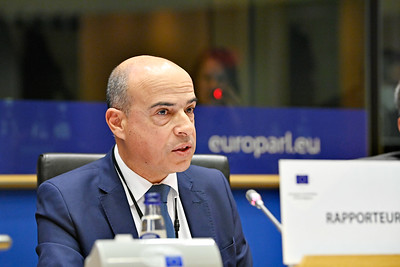The opinion “Putting people first, securing sustainable and inclusive growth, unlocking the potential of the EU’s outermost regions” drafted by Pedro de Faria e Castro (PT/EPP), Undersecretary of the Presidency of the Azores Regional Government, was unanimously adopted at the 153rd plenary session of the European Committee of the Regions in Brussels, on 8 and 9 February. This draft opinion is the result of joint coordination work carried out within the Conference of Presidents of the Outermost Regions.
The impact of the COVID-19 pandemic crisis, the additional pressure triggered by Russia’s war against Ukraine and an increasing number of natural disasters make it of urgent importance to deploy a renewed and ambitious support strategy for Europe’s outermost regions – This is the key message delivered by the European Committee of the Regions (CoR) during its 8 February plenary session.
The five million EU citizens who live in outermost regions – Guadeloupe, French Guiana, Martinique, Réunion, Mayotte, Saint-Martin, the Azores, Madeira and the Canary Islands – face a range of specific vulnerabilities, owing to the geographic characteristics, remoteness and isolation of these territories. These challenges have been compounded by a succession of natural disasters, increasingly frequent due to climate crisis, by the pandemic of COVID-19 as well as by the war against Ukraine, which risks now undermining their recovery.
In this context, the opinion calls for an update of EU support policies and investment tools for the EU’s outermost regions. Speaking at the plenary session, the rapporteur stressed that “the outermost regions are territories which, in the current geopolitical framework and systemic changes in the European and international economy, offer a wealth of opportunities to the EU. It is impossible to capitalise on this potential without addressing the structural weaknesses and constraints of these territories, which require European policies to be adapted. This is the essence of Article 349. Only a policy adjusted to the specific characteristics of the ORs will enable structural and sustainable development, that brings hope to their populations. This opinion is a further decisive step towards providing the responses, which are essential in order to face up to the challenging times in which we live”.
The CoR’s opinion draws attention to the urgent need to address the significant social and economic inequalities of the outermost regions relative to mainland Europe and calls on the European Commission to support these regions in the process of convergence with the rest of the European Union.
Given the outermost regions’ greater vulnerability due to their remoteness and isolation from European mainland, obligations to meet the new targets on emissions and fuel taxation arising from the Fit for 55 package risk having a disruptive impact on remote regions’ economies and societies. The Committee therefore urges policies to promote the energy autonomy of these regions, through targeted support and the development of policies that allow for an appropriate and affordable transition from the current dependence on fossil fuels to sustainable energy sources.
It is also highlighted the role of outermost regions in strengthening the maritime dimension of the European Union, which has the world’s largest maritime area, with an exclusive economic zone (EEZ) of more than 25 million km2. In this light, the CoR welcomes the Commission’s commitment to review the reporting procedure requirements and the provisions allowing state aid for the renewal of the fishing fleet in these regions.
In addition, the tourism sector plays a critical role in the development of the outermost regions and has a major impact on their economic growth, employment and regional development. In this opinion, the Committee requests the European Commission to step up the development of a European tourism policy that provides for the creation of a European Tourism Agency, supports the green and digital transition of European tourist destinations and accelerates the economic recovery from the pandemic of this strategic sector.
Finally, the CoR calls for pragmatic and tailored solutions to be adopted as a matter of urgency, systematically applying Article 349 of the TFEU, in order to avoid the objective of economic, social and sustainable recovery being undermined. In his concluding remarks, rapporteur Pedro de Faria e Castro stressed that “the time has come to swiftly implement the Commission’s commitments to these regions. I am sure that this opinion of the Committee of the Regions is another decisive step forward on the way to providing specific and immediate responses to the current context and difficult times ahead, which particularly affect the most fragile regions such as the ORs”.


